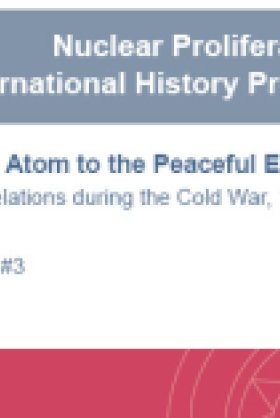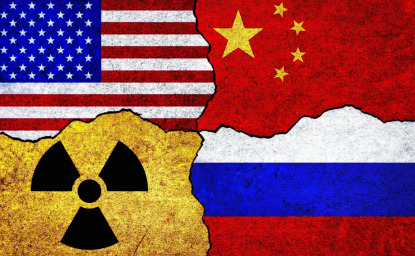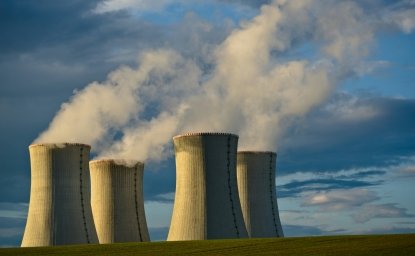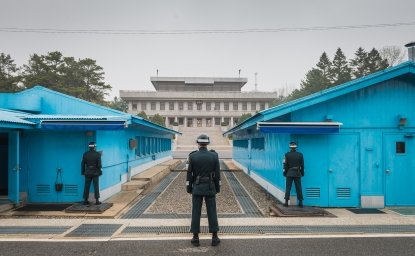From the Peaceful Atom to the Peaceful Explosion




NPIHP Working Paper #3. Jayita Sarkar explores technological collaboration between the French and Indian Atomic Energy Commissions, using new archival documents to expose how shared opposition to U.S. information censorship and the desire to preserve foreign policy independence fostered nuclear collaboration between the two nations.
Key Findings
France and India negotiated the first ever nuclear cooperation agreement (NCA) in reactor technology in 1951, prior to President Eisenhower’s 1953 “Atoms for Peace” proposal.
- This was the first NCA to be negotiated outside the Manhattan Project powers, i.e. the United States, the United Kingdom and Canada.
- This was the first such agreement between a developed and developing country. France supplied technology while India supplied mineral resources and the two countries conducted joint technical studies on beryllium-moderated reactor technology, sharing their findings with each other.
- The NCA was unique against the backdrop of U.S.-led postwar censorship of information on atomic energy.
While maintaining an exports embargo on its strategic minerals, including beryllium since 1948, India granted priority access to its beryllium to France, under this NCA.
- This resulted from India’s perception of U.S. and British attempts at accessing India’s strategic minerals as “neo-colonial” While London resented the loss of control over the resources of its former colony, Washington attempted to gain access to strategic minerals all over the world. Neither of the two countries wanted to provide technology to India for the processing of its strategic minerals, which India strongly desired.
- The 1951 Indo-French NCA, which outlined equal partnership between the two atomic energy commissions, alleviated India’s insecurities over losing control of its own resources. The joint research and technical studies stipulated within the NCA were favorable to India’s quest for nuclear technology.
The obstruction to atomic energy research that the Indian Atomic Energy Commission (AEC) and the French Commissariat à l’Energie Atomique (CEA) faced from the U.S.-led postwar information censorship facilitated their technological cooperation. The “Manhattan complex” played an important role in French cooperation, as did India’s postcolonial quest to catch up with the West. In addition to this, the personal proximity of scientists from the two countries enabled Indo-French nuclear relations to continue despite diplomatic differences between their foreign ministries, namely the South Block and Quai d’Orsay.
- While the personal relations between scientists attached to the two national atomic energy bodies were important, nuclear cooperation was also influenced by hard, materialistic factors like economic costs. As the 1963 Tarapur agreement demonstrated, India abandoned the French offer for unsafeguarded reactors for partially safeguarded U.S. reactors, owing to the favorable Exim Bank loan offered by the United States.
The election of Valéry Giscard d’Estaing in May 1974, soon after India’s underground nuclear test, led to a disagreement between the Gaullist backed CEA and the Giscardists.
- This led to the contradictory French reaction to India’s test—while the CEA sent a congratulatory telegram to the AEC, Quai d’Orsay began to renegotiate its nuclear technology contracts with the South Block.
The main challenge for Giscard d’Estaing was meeting non-proliferation goals without hurting the economic interests of the French nuclear industry.
- As the case of the plutonium reprocessing plant in Pakistan demonstrated, France refused to publicize its decision to abrogate the agreement in 1978, fearing domestic backlash.
- While Quai d’Orsay renegotiated its contracts, the Indian ambassador to France, Dwarka Nath Chatterjee, advised South Block to readily accept French demands for strict safeguards. He argued that lax safeguards for India would mean lax safeguards for Pakistan’s plutonium reprocessing plant.
Author


Nuclear Proliferation International History Project
The Nuclear Proliferation International History Project is a global network of individuals and institutions engaged in the study of international nuclear history through archival documents, oral history interviews, and other empirical sources. Read more


Cold War International History Project
The Cold War International History Project supports the full and prompt release of historical materials by governments on all sides of the Cold War. Read more


History and Public Policy Program
A leader in making key foreign policy records accessible and fostering informed scholarship, analysis, and discussion on international affairs, past and present. Read more




